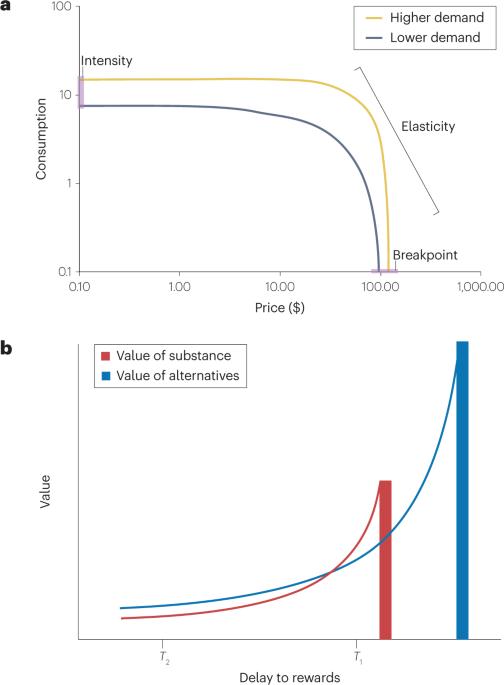A contextualized reinforcer pathology approach to addiction
IF 21.8
Q1 PSYCHOLOGY, MULTIDISCIPLINARY
引用次数: 5
Abstract
Behavioural economic accounts of addiction conceptualize harmful drug use as an operant reinforcer pathology, emphasizing that a drug is consumed because of overvaluation of smaller immediate rewards relative to larger delayed rewards (delay discounting) and high drug reinforcing value (drug demand). These motivational processes are within-individual determinants of behaviour. A third element of learning theory posits that harmful drug use depends on the relative constraints on access to other available activities and commodities in the choice context (alternative reinforcers), reflecting the substantial influence of environmental factors. In this Perspective, we integrate alternative reinforcers into the contemporary behavioural economic account of harmful drug use — the contextualized reinforcer pathology model — and review empirical literature across the translational spectrum in support of this model. Furthermore, we consider how increases in drug-related mortality and health disparities in addiction can be understood and potentially ameliorated via a contextualized reinforcer pathology model in which lack of alternative reinforcement is a major risk factor for addiction. Behavioural economic accounts of addiction suggest that drug consumption arises from overvaluation of small, immediate rewards and drug-specific reinforcement. In this Perspective, Acuff et al. propose an extension to this reinforcer pathology model that highlights the critical role of alternative reinforcers in addiction motivation.

成瘾的情境强化病理学方法。
成瘾的行为经济学解释将有害药物使用概念化为一种操作性强化病理,强调药物的消费是因为相对于较大的延迟奖励(延迟折扣)和较高的药物强化价值(药物需求),较小的即时奖励被高估。这些动机过程是行为的个体决定因素。学习理论的第三个要素认为,有害药物的使用取决于在选择环境中对获得其他可用活动和商品的相对限制(替代加强剂),这反映了环境因素的巨大影响。从这个角度来看,我们将替代强化剂纳入有害药物使用的当代行为经济学解释——情境化强化剂病理学模型——并回顾了支持该模型的翻译范围内的经验文献。此外,我们还考虑了如何通过情境强化病理模型来理解和潜在地改善成瘾中与药物相关的死亡率和健康差异的增加,在该模型中,缺乏替代强化是成瘾的主要风险因素。
本文章由计算机程序翻译,如有差异,请以英文原文为准。
求助全文
约1分钟内获得全文
求助全文

 求助内容:
求助内容: 应助结果提醒方式:
应助结果提醒方式:


